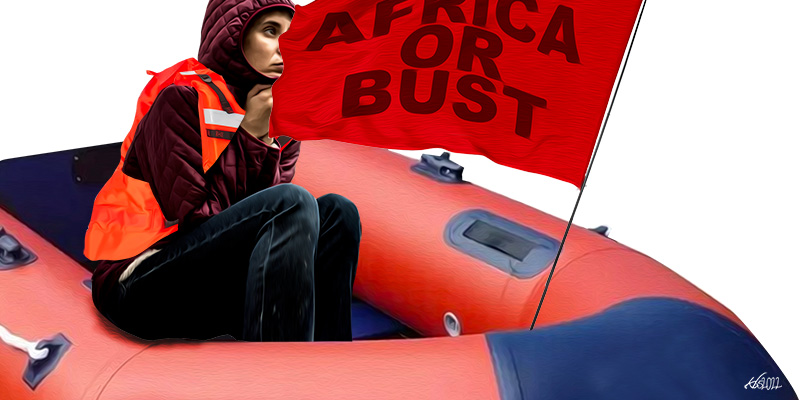Ever since it appeared in the epigraph of Edward Said’s influential critique of Western “experts”, Orientalism, Marx’s dismissal of the French peasantry has come to stand for everything wrong with a certain type of condescending political crusade: elites speaking on behalf of groups viewed as incapable of articulating their own interests.
Commonly known in the humanitarian world as “saviourism”, this patronizing tendency is entrenched within the field of displacement governance, where highly placed individuals employed by donor agencies regularly devise policies on behalf of downtrodden communities whose circumstances are remote from their own.
The dramatic rise to prominence of RLOs (Refugee-led Organizations) presents an important challenge to the paternalism of this order.
Within a short space of time since 2018 when an historic summit in Geneva was convened by refugee leaders from across the world, demands for “a seat at the table” have been recognized at the highest level. In 2019, the UN invited RLO representatives to its own Global Refugee Forum. In 2020, Canada announced an advisory role for a former refugee to observe its international protection meetings; Germany and the USA have since followed suit, underlining the growing acknowledgement of the legitimacy and significance of refugee leadership.
On the surface, these developments would seem to suggest the RLO phenomenon is a rare example of successful “localization”—the transfer of resources and decision-making power to stake-holding communities.
Yet little is known about the regional trajectories of RLOs. This despite the fact that local (or “glocal”) actors in the Global South laid the foundations for the aforementioned developments on the world stage. Without data on the impact of RLOs in camps, settlements and cities where their most important work takes place, their contributions and the obstacles they face remain poorly understood.
Having worked for an international organization as a migration specialist in Kenya and visited Uganda, I’m struck by the vibrancy of RLO mobilization in both countries, as well as the persistent challenges they face. Their successes and their struggles reflect the specificities of displacement governance in East Africa and the surrounding regions—the Great Lakes and Horn of Africa. Tanzania, Kenya and Uganda each host some of the largest refugee populations in the world. Conditions and regulatory frameworks vary and are far from perfect for RLOs in these countries. For the most part, however, they shoulder their “burdens” without succumbing to the anti-immigrant xenophobia rife in more affluent nations. Presidents Museveni of Uganda and Kagame of Rwanda each have lived experience of exile, a fact that reflects a certain acceptance of displacement as a mundane reality rather than an alarming aberration.
This context has important implications for the political agency of refugees. For whilst their participation in public life remains limited and is at times curtailed, RLOs in this region are particularly dynamic and advanced. It is no coincidence that Ugandan RLOs, where refugees enjoy freedom of mobility and association, have played a leading role in the movement for refugee participation in Africa. Studies have identified between 20 and 30 such groups operating in Kampala, home to some 80,000 refugees. The precise number is difficult to ascertain given that RLOs vary in size and visibility.
Defined loosely as organizations established and led by refugees, RLOs include well-established NGOs with transnational networks, funding partnerships and global profiles such as HOCW (Hope of Children and Women Victims of Violence), whose capacious premises in Kampala are not so different from the national or indeed international NGO offices that I have visited in Asia and Africa.
It is no coincidence that Ugandan RLOs, where refugees enjoy freedom of mobility and association, have played a leading role in the movement for refugee participation in Africa.
At the other end of the spectrum, RLOs can be small, informal, community-based “self-help” groups that operate without donor funding or formal membership. Between these two poles are medium-sized operations that lack substantial funding but are registered and possess formal membership structures.
A recent study by refugee researchers, which identified 63 RLOs in Uganda and 138 in Kenya, claimed beneficiaries report positive experiences with RLOs because they treat them with greater dignity and understanding of their needs than larger humanitarian agencies. Service delivery is adapted to local conditions and as a result, targeted towards the needs of groups and individuals. It also tends to be less bound by bureaucratic rules, reaching the newly arrived who lack documentation—often the most vulnerable.
More than mere service-delivery, RLOs are increasingly engaged in advocacy. HOCW’s Congolese founder, John Bolingo Ntahira, contributed to the inaugural Global Refugee Summit in 2018, and remains on the Global Refugee Network’s steering committee, underlining East African RLOs’ pivotal role in driving the international movement for refugee representation in policy-making.
Together with a handful of other pioneering RLO leaders, Bolingo set up RELON (Refugee-Led Organizations Network) in 2017, a network headquartered in Kampala that has branched out into other African countries.
Expanding through international gatherings and leveraging connections in the African Union are high priorities for RELON, which is keen to develop a continental voice. It has campaigned successfully in host countries on issues such as refugees’ access to vaccines, travel documents, and the registration of SIM cards.
This penchant for building solidarities across borders and working at multiple scales of governance holds the key to the innovative potential of RLOs. As transnational actors with diasporic links and cosmopolitan sensibilities, refugee leaders I met are well-travelled, well-networked and inclined towards Pan-African solutions. Unlike many career diplomats who might claim the same, the continental coalitions they build are comprised of people with lived experience of the challenges faced in exile—individuals like Bolingo who shared a home with 70 compatriots in an old bus converted into a make-shift shelter in the early 2000s.
This penchant for building solidarities across borders and working at multiple scales of governance holds the key to the innovative potential of RLOs.
Who better to address the interests of displaced persons than men and women who have themselves experienced or witnessed mortal threats, precarious border-crossings and destitution first-hand, and who still dwell among refugee communities?
***
The UNHCR has taken various strides toward enabling meaningful RLO participation, such as issuing innovation awards to RLOs for their work during the pandemic and piloting small grants. More generally, the working relationship between RLOs and big players within the international humanitarian order expands daily with new initiatives documented on social media amidst smiles and handshakes. The former wish to project themselves as legitimate actors on the world stage, in close proximity to the latter, who in turn find it increasingly incumbent upon them to demonstrate awareness of the importance of RLOs.
Yet, beneath the surface of these exchanges lies a simmering tension. Several refugee leaders I interviewed made allegations of bad faith against powerbrokers in the humanitarian field, accusing them of condescension and placing obstacles in their path: actively undermining their access to funding and/or oppressively “micro-managing” them in exploitative unequal “partnerships”, and excluding and patronizing them at every turn.
“Our ‘big brothers’ don’t want to recognize us,” said a key figure in Kenya bitterly. He is convinced that those who currently control the purse strings “fear” losing privileged positions over organizations such as his own. Others who stopped short of explicit accusation made their sentiments known through body language: brows furrowed, jaws clenched at the mere mention of the behemothic agencies, donors and organizations that comprise the humanitarian establishment.
A 2020 article by Oxford researchers lifts the lid on the history of this encounter with sordid allegations against at least one UNHCR IP (Implementing Partner), InterAid, which stands accused of setting up a fake CBO (Refugee Now) run by its own staff to create false evidence of “community” engagement. If the truth of such matters is difficult to verify, their legacy of mistrust and grievance is clear.
At a conference on localization last March in Nairobi during NGO week, refugee leaders and their allies lamented the lack of structural transformation when it comes to funding flows and decision-making in the humanitarian field. Attendees and speakers included Jean Marie Ishimwe, founder of Youth Voices Community, a Kenyan RLO, and INGOs such as Trócaire, an Irish charity committed to localization.
Frustration that growing RLO visibility during the pandemic has failed to alter mind-sets and bottom lines when it comes to partnerships and budgets was palpable. RLOs complained of being instrumentalized or ignored altogether by most big donor agencies and their IPs. Too often, they said, “inclusion” takes the form of tokenism: invitations to participate in activities typically expect them to mobilize their communities for the realization of projects that have already been designed. Offers of “capacity-building”, meanwhile, rarely consider the pedagogical potential of RLOs, whose local knowledge and lived experience of displacement is often lacking among so many of their expat counterparts employed by international and national NGOs. They lamented the lack of multi-year funding for the development of their administrative capacity, a gap that leaves them unable to hire or retain qualified professionals that might boost their ability to attract funding independently, reinforcing their dependency on larger organizations.
Frustration that growing RLO visibility during the pandemic has failed to alter mind-sets and bottom lines when it comes to partnerships and budgets was palpable.
None of this will surprise observers of localization given the almost complete failure to implement the “Grand Bargain” of 2016, which promised to funnel a quarter of humanitarian funds directly to national and local actors within the field of humanitarian governance but delivered a mere 0.5 per cent of tracked funding in 2019.
***
The hesitancy of large donors to fund RLOs stems at least in part from genuine constraints. RLOs, they say (in private), can be too small and unprofessional to manage and effectively spend large grants that require complex financial auditing. A related concern is the perception that RLOs are unstable given the changing personal trajectories of staff and/or founders, whose individual asylum and resettlement claims can mean suspending operations mid-way through funding cycles. Then there is concern about the potentially distortive impact of funding RLOs, whose ethnic, religious and/or national affiliations arguably make them unsuitable for serving broader, diverse refugee publics.
My own inquiries confirmed what researchers have already documented: that none of these charges should be dismissed, because each contains a grain of truth.
Most RLOs do begin as CBOs catering for specific ethnic and national groupings; oftentimes they possess limited administrative capacity. Those that do manage to grow in size and ambition do indeed tend to be headed by well-educated men. Moreover, it is not unknown for the personnel of RLOs to be resettled in the course of funding cycles. I also heard several references to “founder’s syndrome”, a psychological disorder among some egoistic individuals who struggle to detach their personal interests from those of the organization they have established.
In view of such challenges, some of the most enthusiastic supporters of refugee leadership are seeking to bridge the gap between RLOs and the powerbrokers that perpetuate their exclusion constructively.
COHERE, an INGO with offices in Kampala and Nairobi, has thrown its full weight behind putting refugee-led organizations “in the driving seat”. It does this through training and advice to RLOs on how to attract funds, how to implement and document project work effectively, and how to plan strategically in the longer term. If in its advocacy COHERE counters prejudice among RLO-sceptics, much of its daily work addresses donors’ concerns through corrective measures that acknowledge the need for work on all sides.
Some of the most enthusiastic supporters of refugee leadership are seeking to bridge the gap between RLOs and the powerbrokers that perpetuate their exclusion constructively.
Herein lies the difference between COHERE and reactionary big players dragging their feet on localization: Where the latter use RLOs’ weaknesses as justification to prolong a status quo in which the former can only ever be “beneficiaries”, tokens and symbols in projects they design themselves, the former view them as obstacles that can and must be removed to create a more level playing field.
A glimpse at COHERE’s network provides strong evidence of RLOs’ ability to grow and develop in ways critics seem reluctant to acknowledge. In Kampala, I visited Bondeko Refugee Livelihoods Centre, founded by a Congolese priest now resettled in Canada. Far from parochial, its young staff and membership was diverse in terms of gender and ethnicity: many of those it supports are from Burundi and Rwanda, and like many refugee businesses in Kampala, it even provides employment for Ugandan citizens. The founder’s resettlement seems not have had adverse consequences.
***
As an expat employed by an international organization engaged in advocacy, refugee leaders’ critiques of the humanitarian sector’s paternalism can feel close to the bone. When they fume against the condescension of do-gooders who represent their interests without walking in their shoes, are they talking about me?
None of the refugee leaders I interviewed for this article said so (explicitly), and it would be easy enough to join them in pointing fingers elsewhere. More challenging than “speaking the truth to power”, however, is speaking it to oneself: to admit that the entrenched privilege they seek to dismantle includes my own.
To the legions of foreign “experts” whose postings in the Global South involve analysing, shaping or influencing policies that do not directly affect us, RLOs pose questions we should be asking ourselves everyday about our long-term presence and role in the Global South. Above all: What are we doing to devolve power and resources to present and future generations of stakeholders?
Signatories of the Charter 4 Change such as COHERE and Trócaire have committed to channelling a quarter of humanitarian funding directly to national and/or local NGOs. But many larger bureaucratized entities with decades of heritage and established identities have shown little urgency in adapting to a world in which refugees are partners rather than beneficiaries. Despite many words and some (limited) deeds, commitment to structural reform remains unproven and there is scant evidence of the soul-searching that should be taking place.
For African NGOs, a different kind of self-reflection may be required. Although “local” in terms of registration, these tend to be staffed by highly educated professionals hailing from host country elites, among whom lived experience of exile is rare. It is easier for them to attract donor funding than RLOs, which can cause resentment and rivalry. One refugee leader I interviewed seethed as he recounted rebuffing an invitation from a national NGO to participate in a project as a beneficiary: “We’ll get our own funding to work on this issue,” he scoffed, insisting he could have implemented the same project more effectively.
Devota Nuwe, acting Co-Director of The Refugee Law Project, a highly respected national NGO based in Kampala, has occasionally found herself on the receiving end of such sentiments in the course of her career as a displacement specialist. The kinds of remarks directed at her and her colleagues by individual refugee leaders aggrieved at salaried professionals whose job it is to support them suggest a frankness rarely directed against INGO workers. (“Those clothes you’re wearing, it’s because of us!”).
What such sentiment fails to acknowledge is that there are contexts in which refugees cannot easily represent themselves—in which they must be represented by non-refugees. Defending or appealing on their behalf in courts of law, for example, is specialized work that requires qualified professionals acquainted with the host country’s legal system and political context.
Perhaps this explains Nuwe’s relaxed attitude towards the rise of RLOs, whom she and her colleagues have welcomed into their industry, despite the occasional criticism that comes their way. “There’s room for all of us,” she chuckles, when I ask her if she ever gets anxious about the prospect of a competitive threat from individuals who openly tell her they should be in her place.
In truth, national NGOs that enjoy the trust of their stakeholders have nothing to fear from the rise of RLOs. The same can be said of INGOs already cooperating in partnerships with RLOs, in which each plays a distinct but complementary role to achieve common objectives.
In truth, national NGOs that enjoy the trust of their stakeholders have nothing to fear from the rise of RLOs.
Indeed, there is something to be said for UN Secretary-General Ban Ki-moon’s oft-cited commitment to making humanitarian action “as local as possible, as international as necessary”. The trouble with the current setup is that it under-utilizes the potential of refugees, and is far more international than it needs to be. In the words of John Bolingo Ntahira: “No one understands refugees’ problems better than we do”. Those of us who profess expertise on displacement would do well to acknowledge this basic fact and its transformative potential.
–
This article is part of a series on migration and displacement in and from Africa, co-produced by the Elephant and the Heinrich Boll Foundation’s African Migration Hub, which is housed at its new Horn of Africa Office in Nairobi.








